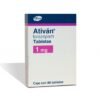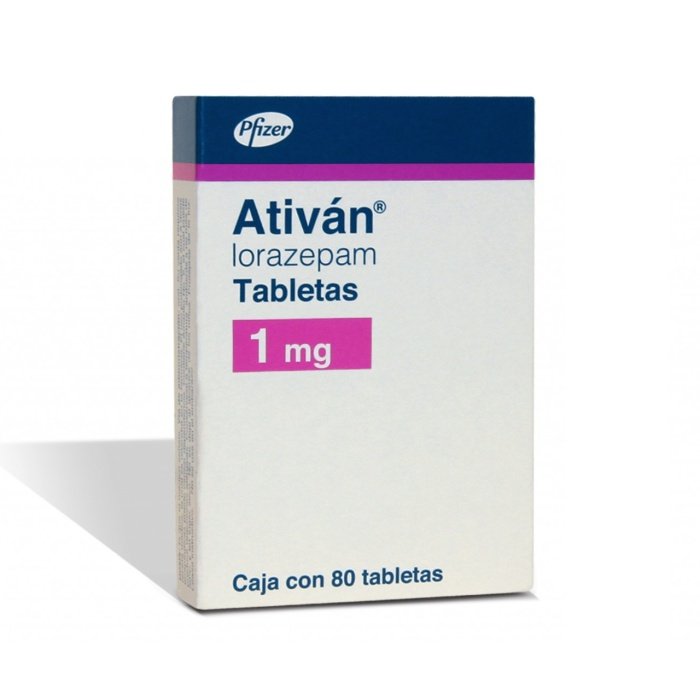Ativan 1mg
$259.80 – $499.00
Compare+1 (862) 505-1407 Start Live Chat
Description
What is Ativan 1mg ?
Ativan, known generically as Lorazepam, is a medication belonging to the class of drugs known as benzodiazepines. These medications are widely recognized for their sedative, anxiolytic, and muscle relaxant properties. Ativan is primarily prescribed for the treatment of anxiety disorders, serving as an effective short-term solution for individuals experiencing acute anxiety episodes. Additionally, it is utilized to manage insomnia, particularly when sleep disturbances are related to anxiety or stress. A key aspect of Ativan’s therapeutic profile is its use in treating seizure disorders, offering a means to control and prevent seizure activity in certain patients.
The mechanism of action of Ativan involves enhancing the effects of a neurotransmitter called gamma-aminobutyric acid (GABA). By binding to specific sites on the GABA-A receptor in the brain, Lorazepam facilitates increased GABAergic activity. This results in an overall calming effect on the central nervous system, thereby alleviating symptoms of anxiety and promoting sleep. The effectiveness of Ativan is generally observed within a relatively short time frame, contributing to its popularity among healthcare providers for immediate relief of anxiety and related conditions.
Ativan is available in various forms, including oral tablets, injectable solutions, and even as a liquid formulation, accommodating different patient needs and preferences. It is essential to note that Ativan is a prescription-only medication, reflecting its potential for dependence and abuse. Therefore, it is typically prescribed after a thorough assessment by a qualified healthcare professional, who will determine the most appropriate dosage and duration of treatment based on the individual’s specific medical circumstances. Understanding the uses and effects of Ativan is crucial for anyone considering this medication as part of their therapeutic regimen.
Dosage and Administration of Ativan 1mg
The administration of Ativan, particularly in its 1mg formulation, is tailored to individual patient needs. The standard dosage for adults typically begins at 1mg, which may be adjusted based on various factors. These include the patient’s age, weight, severity of the condition being treated, and their prior response to treatment. Understanding these elements is crucial for achieving therapeutic effectiveness while minimizing the risk of side effects.
For adults experiencing anxiety, the initial dose may be set at 1mg, taken up to three times daily. In the case of patients dealing with insomnia due to anxiety or transient situational stress, a dose of 1mg may be administered at bedtime. However, it is essential to monitor the patient closely, as the doctor may decide to increase or decrease the dosage depending on the individual’s responsiveness and any adverse reactions that may arise.
Age and weight can significantly impact the required dosage of Ativan. Elderly patients or those with existing liver or kidney conditions often require lower doses to avoid complications. Similarly, individuals with higher body mass may necessitate dosage adjustments to ensure effective treatment. Additionally, careful consideration should be given to the duration of use. Prolonged usage of Ativan can lead to dependence, and healthcare providers typically recommend regular reviews of the treatment plan to assess efficacy and safety.
It is essential to take Ativan as prescribed, observing the specified schedule. If a dose is missed, patients should take it as soon as they remember. However, if it is close to the time for the next dose, one should skip the missed dose and resume the regular dosing schedule. Patients should never take two doses at once, and adherence to the prescribed regimen is vital to ensure the medication’s effectiveness. Guidance from a healthcare professional is paramount for safe and effective administration. In conclusion, diligent attention to dosage and administration practices will foster a better treatment experience with Ativan.
Potential Side Effects and Risks
Ativan, known generically as lorazepam, is a medication frequently prescribed to manage anxiety, seizures, and insomnia. While its efficacy is widely recognized, understanding the potential side effects and risks associated with Ativan 1mg is essential for safe use. Common side effects include drowsiness, dizziness, and confusion. These symptoms may impair an individual’s ability to perform tasks requiring focus, such as driving or operating machinery. Users might also experience other effects, including dry mouth, fatigue, or changes in appetite.
More serious side effects can occur, particularly during excessive use or abrupt cessation of the medication. Respiratory depression is among the most alarming risks, as it can lead to decreased oxygen levels in the blood, causing severe complications. Individuals who have pre-existing respiratory conditions or those who take multiple sedative medications may be at a higher risk for experiencing this side effect. It’s crucial to inform healthcare providers of any ongoing treatments to minimize the likelihood of adverse interactions.
Another significant concern associated with Ativan is the risk of dependency. Prolonged use, particularly at higher doses, can lead to psychological and physical dependence. Patients may experience withdrawal symptoms if they abruptly stop taking the medication after long-term use. These withdrawal symptoms can include increased anxiety, insomnia, and seizures. Moreover, individuals in certain populations, such as the elderly or those with liver or kidney disorders, may face augmented risks and require careful monitoring. Therefore, tailored prescribing and adherence to guidelines are vital to mitigate these risks effectively.
Interactions with Other Medications
Ativan, also known by its generic name lorazepam, is a benzodiazepine primarily used to manage anxiety disorders and other conditions requiring sedation. As with many medications, it is crucial to understand how Ativan may interact with other pharmaceuticals, over-the-counter drugs, and herbal supplements. These interactions can significantly affect the efficacy of treatments and potentially lead to adverse reactions.
Certain drug classes pose a higher risk of interaction when taken alongside Ativan. Notably, other central nervous system (CNS) depressants, such as opioids, alcohol, sleep aids, and other benzodiazepines, can amplify the sedative effects of Ativan. This may lead to increased drowsiness, respiratory depression, and other dangers associated with excessive sedation. Pharmacological compounds that depress CNS functioning should be used cautiously under medical supervision when combined with Ativan.
Moreover, some over-the-counter medications, including certain antihistamines and muscle relaxants, share similar sedative properties and may potentiate Ativan’s effects. Herbal supplements, particularly those containing kava, valerian root, or St. John’s Wort, can also interact negatively with Ativan, either diminishing its therapeutic effects or increasing the likelihood of undesirable side effects.
Given the potential for significant interactions, it is imperative for patients to consult their healthcare providers prior to combining Ativan with any other agent. A thorough review of current medications, including prescriptions, over-the-counter products, and supplements, allows healthcare professionals to assess the risk of interaction more effectively. Thus, ensuring patient safety and optimizing the therapeutic regimen is a fundamental consideration when using Ativan in conjunction with other substances.
Alternatives to Ativan
Ativan, or lorazepam, is commonly prescribed for conditions such as anxiety, insomnia, and seizures, but several alternatives exist for those seeking different treatment options. Pharmacological alternatives include medications like buspirone for anxiety, which is less sedating and has a lower potential for dependence. Selective serotonin reuptake inhibitors (SSRIs), such as sertraline and fluoxetine, are also widely used to treat anxiety disorders, offering long-term relief through mood regulation.
Other benzodiazepines such as clonazepam and diazepam might be considered, yet they come with similar risks of dependency as Ativan. Additionally, certain anticonvulsants like gabapentin have shown efficacy in managing anxiety and mood disorders without the prominent sedative effects. For acute situations, beta-blockers, like propranolol, can alleviate physical symptoms of anxiety, such as trembling and rapid heartbeat, making them suitable for performance anxiety.
On the non-pharmacological front, cognitive-behavioral therapy (CBT) remains a cornerstone for treating anxiety and panic disorders. This therapeutic approach equips individuals with coping mechanisms and tools to navigate overwhelming feelings effectively. Mindfulness practices, including meditation and yoga, have gained traction for their benefits in reducing tension and enhancing emotional well-being. These techniques can act as preventive strategies rather than mere reactive solutions.
Furthermore, lifestyle modifications such as regular exercise, healthy eating, and quality sleep significantly contribute to overall mental health. Establishing a strong support network of friends or family can also bolster emotional stability.
In conclusion, while Ativan is effective for treating various conditions, it is crucial to explore alternative approaches that may suit individual needs better. Engaging in open discussions with healthcare providers ensures informed decision-making about treatment plans and fosters responsible usage of medications. Careful consideration of both pharmacological and non-pharmacological alternatives allows individuals to manage their health in a holistic and balanced manner, reducing the risk of dependence and promoting long-term wellness.
Additional information
| Pills | 180, 60, 90 |
|---|






Reviews
There are no reviews yet.